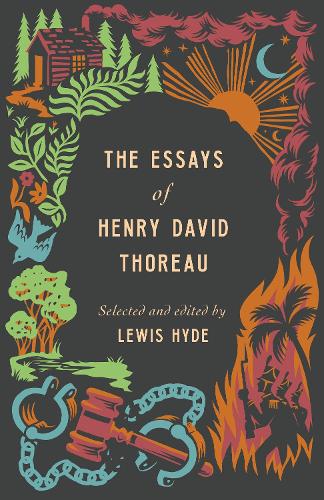
The Essays of Henry David Thoreau
(Paperback)
Publishing Details
The Essays of Henry David Thoreau
By (Author) Lewis Hyde
By (author) Henry David Thoreau
Milkweed Editions
Milkweed Editions
2nd January 2026
United States
Classifications
General
Non Fiction
Nature and the natural world: general interest
Anthologies
Physical Properties
Paperback
464
Width 139mm, Height 215mm
Description
A definitive collection of Henry David Thoreau's major essays, annotated and introduced by Lewis Hyde.
Diverging from the long-standing custom of separating Thoreau's politics from his interest in nature, renowned author Lewis Hyde brings together essays that highlight the ways in which these two strands of thought were intertwined. Here, natural history begins not with fish and birds, but with a dismissal of the political world, and condemnation of slavery concludes with a meditation on the water lilies blooming on the Concord River.
This definitive edition includes Thoreau's most famous essays, "Civil Disobedience" and "Walking," along with lesser-known masterpieces such as "Wild Apples," "The Last Days of John Brown," and an account of Thoreau's 1846 journey into the Maine wilderness to climb Mount Katahdin-an essay that ends on a unique note of sublimity and terror in the face of raw nature. While Thoreau's ideal reader was expected to be politically engaged in current affairs and well versed in Greek, Latin, poetry, and travel narrative, Hyde's inviting annotations clarify many of Thoreau's references and recreate the contemporary context of the day, when the nation's westward expansion was bringing to a head the racial tensions that would result in the Civil War.
Hyde deems Thoreau's writing prophetic because "the prophet speaks of things that will be true in the future because they are true in all time." Thoreau's revelatory writing coupled with the luminous insights from Hyde-"one of our country's greatest public thinkers" (Lawrence Weschler)-make The Essays of Henry David Thoreau essential reading at a moment in our nation's history when his subversiveness, foresight, and lyricism are badly needed.
Reviews
Praise for The Essays of Henry D. Thoreau
Hydes volume is a well-chosen, handsome collection of essays with a splendid introduction. Everyone will want to use itits a real contribution.Robert D. Richardson, author of Henry Thoreau: A Life of the Mind
This thoughtfully edited gathering of Thoreaus essays will surely be of great interest both to Thoreauvians and to readers approaching his work for the first time.Lawrence Buell, Harvard University
Astonishing that so many pages of such great writing (and such wonderful, interesting annotations) can be purchased for so little money. We have needed an inexpensive annotated edition of Thoreaus best short prose for a very long time, and this clearly fits the bill. Teachers and students, in particular, will find this book extraordinarily useful. The Thoreau material and annotations alone are extraordinarily valuable, but Hydes excellent introduction on Thoreaus Prophetic Excursions make this the best deal available for a Thoreau book. Buy it; youll be glad you did!Bradley Dean, editor of Thoreaus Wild Fruits and Faith in a Seed
Praise for Lewis Hyde
Lewis Hyde is a national treasure, one of our true superstars of nonfiction.David Foster Wallace
One of our countrys greatest public thinkers.Lawrence Weschler
Author Bio
Lewis Hyde is a poet, essayist, translator, and cultural critic. A MacArthur Fellow and renown author, his previous books include The Gift, Trickster Makes This World, and A Primer for Forgetting. Hyde is a trustee of MacDowell and a founding director of Creative Capital. He was previously the director of undergraduate creative writing at Harvard University and taught writing and American literature for many years at Kenyon College. Now retired, he and his wife, the writer Patricia Vigderman, live in Cambridge, Massachusetts. Henry David Thoreau is one of the most widely recognized names in American letters. Born in 1817, he wrote extensively on naturalism, transcendentalism, philosophy, global and American politics, and abolition. He is best known for is the author of Walden, a seminal text on living simply in a natural environment, and Civil Disobedience, an essay arguing for the individual right to resist a morally unjust state. He died in 1862.
